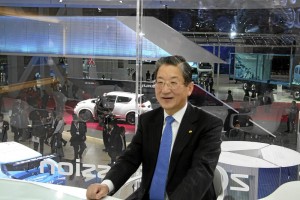‘We have to shift from combustion engines to zero emission’
 At a prominent corner of Nissan’s Tokyo Motor Show exhibit is the Nissan House, an elevated conference room powered by a Nissan Leaf electric car. As the automobile-powered air conditioner hummed unobtrusively, we asked the COO about Philippine cars, the challenges facing Nissan, and the road to zero emission.
At a prominent corner of Nissan’s Tokyo Motor Show exhibit is the Nissan House, an elevated conference room powered by a Nissan Leaf electric car. As the automobile-powered air conditioner hummed unobtrusively, we asked the COO about Philippine cars, the challenges facing Nissan, and the road to zero emission.
Question: What is the position of Nissan globally in the ranking of manufacturers?
Toshiyuki Shiga: Nissan this year is selling 4.8 million cars, so maybe the ranking would be: GM, Toyota, Volkswagen and Hyundai-Kia. Next is Nissan, at number five.
Q: How badly were you affected by the Thai floods? How about the Japan earthquake?
TS: Actually, our plant south of Bangkok was not flooded, fortunately. A lot of suppliers were affected. Because of [disruptions] in the supply chain, we stopped production Oct. 13, one week after the floods started. We stopped for one month. Japan also had a terrible disaster, and I know that Philippines also had floods and major typhoons.
Two plants, located in Tochigi and Iwaki, are in the northern area. They were damaged by the earthquake and the facilities were down. It took two months, thanks to really hard work by our employees. A lot of our suppliers took more time [to resume]. But still, we started production in mid-May, and in June we were back to nearly full production.
Q: How long do you think something like the Pivo3 can become a mass-market product?
TS: At the moment, there is no plan to put the Pivo3 into mass production. We are gauging the customer reaction. The in-wheel motor and automated valet parking will be very popular. Such a car will come, [it is] not just a dream.
Q: Is this lifestyle you are promoting, with the Leaf and the house, is it feasible outside of Japan?
TS: One of the reasons we are developing Nissan power control unit. This unit charges the Nissan Leaf and also supplies power, Leaf to home. After the earthquake, blackouts were a serious problem in Japan, especially during the summer. How to save electricity became a serious issue. The concept of this home is to have solar power charge the Nissan Leaf, and it will be very practical.
Q: Will the Leaf racing car see track time at the Japan Touring Car Championship? Will it replace the GT-R in Super GT racing?
At the moment, regulations are difficult. This type of racing car is suitable for a one-make race. We have already participated in some EV car races, and it is possible in another ten years. Even Formula One may become EV-based.
This year has been one of the most challenging years for Nissan. What did you learn from your experiences this year?
TS: Before making an excuse for something, we should take quick action and try to overcome these crises. We have the united power of employees behind us—it is very important. Our employees work hard to overcome these crises and solve the difficulties one by one. This is better than making an excuse. We have to prepare using risk management, take quick action, and use it as a learning experience for future crises.
Q: You mentioned the strong yen as one of the challenges for Nissan. How important is it to retain manufacturing in Japan?
TS: Nissan manufactures around 25 percent of its cars in Japan. We will maintain Japan production at its current level while growing overall sales. Our Japanese plants always challenge themselves to become more efficient and more innovative. The knowledge can be transferred to overseas production. This is one of the sources of Nissan’s global competitiveness. I want to keep Japan’s production at its current level.
Q: Where do you see your future expansion?
TS: Nissan has invested in the USA, China, Asean, India and Brazil. Asean is an important market for us. I think Philippines has strong potential.
Q: With the vast lineup of Nissan, what are the plans for the Philippine market to get new models?
TS: There are many opportunities for the Philippines. Philippines can be a good manufacturing base—not for cars, but for parts. We have had a good launch for competitive cars like the March in Thailand. Such products will be good for the Philippine market.
Q: When do you foresee that Nissan will no longer have a combustion engine in its cars?
TS: Our forecast is to have 10 percent electric-car lineup of our total by 2020. We have to reduce CO2 emissions. If the United Nations agreement is to reduce CO2 by 50 percent by 2050, that means that the automotive industry has to reduce CO2 by 90 percent up to 2050.
Within forty years, we have to shift from combustion engines to zero emission. Otherwise, we cannot sustain life for the next generation.














